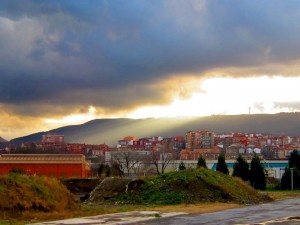Week #1: “Estoy perdido.”
Getting from my home in Arizona to my host madre’s apartment was definitely a bit of an undertaking. I flew from Phoenix to Dallas, to Madrid, to Barcelona, to Bilbao. From the airport in Bilbao, I then took a cab to Getxo, the suburb where all of the students in my program actually live. It was long, there were delays, and it definitely wasn’t the most exciting 30-some hours of my life, but it definitely could have been worse. At least it was more or less without incident. Lots of napping, lots of reading (I brought part of the Game of Thrones series along — nothing quite like a good book to make the time go by quickly), lots of waiting in the airport between flights.
I haven’t studied Spanish in an academic setting since I was sixteen. In the five years since my last Spanish class, I most definitely lost a tragic amount of what I’d learned (if only the saying, “if you don’t use it you lose it,” weren’t so true), but I managed to get in enough practice over the years that I maintained at least some of my Spanish-speaking ability. One of my main motivators for choosing to study in Spain was the hope that I could regain what I had lost, and end the semester truly proficient in the language.
My first few days in Bilbao and Getxo were more than enough to remind me just how rusty my Spanish had become. My host mom speaks no English — which is fantastic, because it means I really have to practice… but is also super challenging, as it means I can’t throw in any English words to fill the gaps in my broken Spanish. Many people here have studied English, but generally, they are at either extreme: fluent in the language, or hardly speak it at all. For the first week here, I typically came across Spaniards who fell in that latter category — especially when I was lost, which to be honest, happened a lot. I wasn’t exactly gifted with the best sense of direction, but I usually am able, at least, to finding my way back to where I’d started… it’s just getting to where I’m going that I’m less than fantastic at. So when someone in my program would give directions, (a.e., “Get off the metro at the Areeta stop, cross the plaza, the restaurant is right there,”) and I inevitably would walk in exactly the wrong direction (“cross the plaza” may be the vaguest direction ever – plazas do not have only one entrance/exit) and wander for an hour, at least I was always able to make it back to the metro. And being lost was great practice for my Spanish, too — “perdon, estoy un poquito perdido — sabe usted donde está ___?” (“Excuse me, I’m a bit lost — do you know where ___ is?”) is a fantastic conversation starter with locals, who fortunately are incredibly nice and generally very willing to try to help. Less fortunately, they also seem to not be much better at directions than I am.
For the first day of orientation, my host mom pointed me in the right direction, told me I needed to exit the metro at the Moyua stop, (fun fact about Basque country: even though everyone speaks Spanish, all of the signage is in Basque — and the two languages are really not all that alike… at all) but I failed to have the foresight to ask, “and then what?” After wandering downtown Bilbao for about 10 minutes and realizing that the building I was looking for wasn’t immediately obvious, I popped into the public library and asked, in my broken Spanish, if the lady at the front desk knew where I was supposed to be. She was probably one of the kindest people I’ve ever met, and went out of her way to look up my program, make a few phone calls, and walk me to my orientation (which of course was just a block away), all the while speaking slow, clear, simple Spanish so I could actually understand. Even more impressive, that sort of genuine kindness and helpfulness is far from being the exception here; Basque people are typically more reserved than Southern Spaniards, but everyone I have encountered has been incredibly sweet.
And really, being lost in Bilbao is definitely not unenjoyable — it’s just unplanned exploration of a beautiful city.
